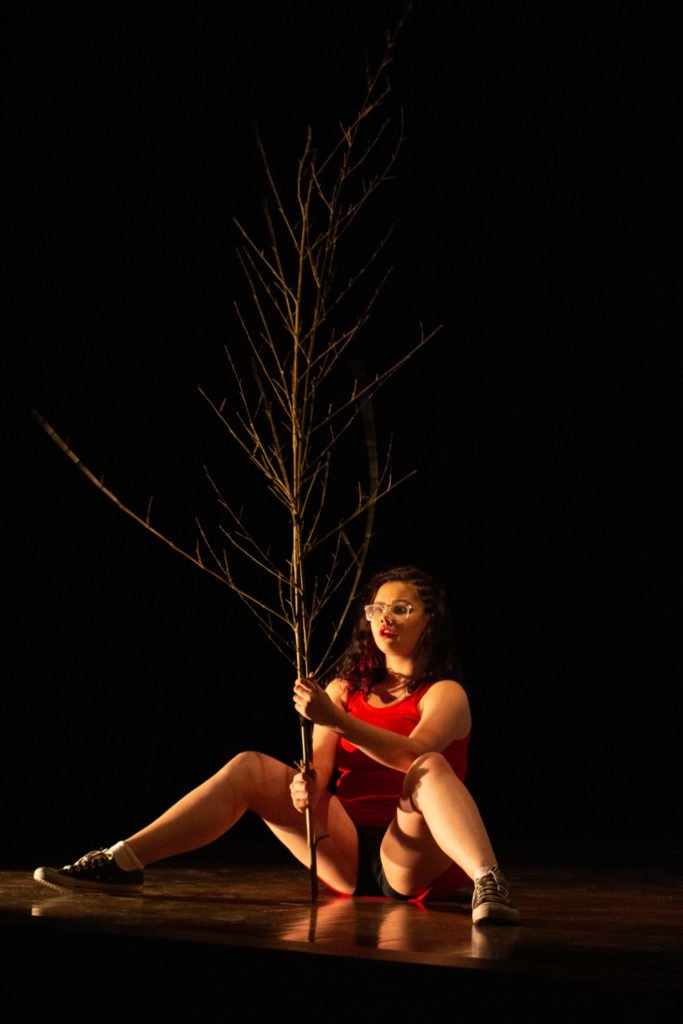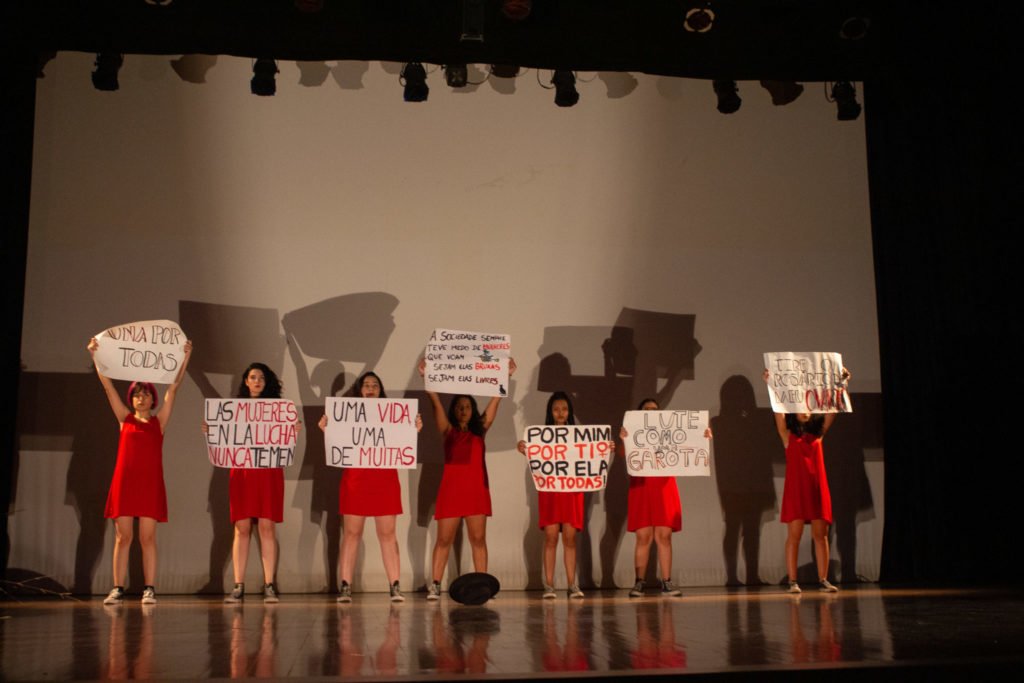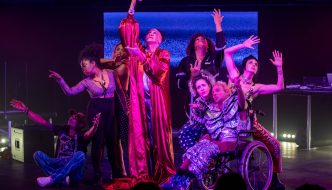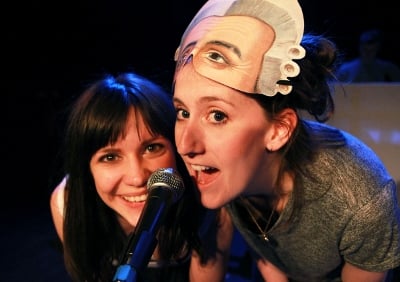“I didn’t want to shock people, I wanted them to engage with the story.” – interview with Una
December 6, 2019
Copyright: Una
Despite Una’s name meaning ‘one, one life, one of many’, she is far from average. Her graphic novel, ‘Becoming Unbecoming’ tells the story of her own experience of sexual abuse set against the backdrop of the Yorkshire Ripper murders. Since it was published in 2015, the book has been translated into six languages and has resonated with readers around the world. This year, she travelled to Brazil to help a young theatre company turn it into a play.
She talked to us about the unlikely collaboration, the response to her book and what it was like to get the call from Woman’s Hour.
‘Becoming Unbecoming’ is intensely personal. What made you write it?
When I was doing my Masters degree my tutor, who knew I liked comics, gave me ‘Maus’ by Art Spiegelman to read. I realised that if it’s possible for someone to draw such an amazing comic about the holocaust, then the capacity of comics is much bigger than people give them credit for. I’m in no way comparing my work to that, but I thought I could contextualise my own experiences in a similar way.
I didn’t want to shock people, I wanted them to actually engage with the story. There are moments in the book that surprise you, but they don’t prevent you from being engaged with the broader story, which is about Yorkshire and the terrible misogyny which seemed to infect the police, society and the media. It was this same misogyny that affected everything around me when I was growing up.
In the early days I showed my work at the Laydeez do Comics forum in London. I was a bit shy about it, but when people started asking me interesting questions I thought, “wow, I really am writing something”. So I made a zine and that’s how I found my publisher, Myriad Editions. Then I went on holiday. We were on a beach in France and I got a message to say I was going to be on Woman’s Hour. That was the first publicity I did. Can you imagine, Woman’s Hour? I was absolutely terrified.
Were you surprised by people’s reactions?
It restored my faith in human beings in many ways. I get loads of messages from women who have read the book and want to tell me their own experience. I get really lovely emails from men saying ‘I read your book and thank you, it was beautiful, but I’m looking at some of my friends in a very different light now’. I’ve also had emails from fathers who want to share it with their daughters, which is so encouraging.
You’re just back from Brazil where you worked on on a stage version of ‘Becoming Unbecoming’. How did that come about?
It was a real collaboration. The group, Coletivo Rubra, is a student theatre company from a place called Mauá, in São Paulo. One of the young women emailed me to ask if I wanted to come and see their play, and the first thing I said was usually if you want to use someone’s work, you have to ask permission first! But it was a non-profit venture and once I saw some of the photographs, which looked really great, I knew it would be something we could work on together.
The group’s leader, Felipe Vieia de Galisteo, had found my book in the library. It’s pretty dangerous to be a woman in Brazil and they wanted to get people talking about rape and abuse of minors, which is a really big problem.
We re-launched the book at a bookshop in São Paulo with my Brazilian publishers Nemo, and the following night we opened the play. The theatre was packed and we got a standing ovation.

Copyright: Una
What’s it like to see your own work on the stage?
It was very powerful. Do you know, when they were speaking my words I was thinking “Did I write that? That’s actually quite good, isn’t it?”
It was also amazing to see how they transformed it. In the book I say that there is no memorial to the thirteen women who were murdered by Peter Sutcliff. People are obsessed with him – there are more than twenty books and films about him, and millions of web pages. But apart from a letter to a lost friend, I found nothing for the women. So at the end of the book I try to imagine what they would have looked like if they had lived, through a series of portraits. I show them as really normal people, because that’s who they were.
In the show they have reimagined my images of the women in text. At the end of the play people in the audience take turns in reading out the stories. It was so powerful. They had created a memorial.
Are movements like #MeToo changing attitudes towards sexual violence against women?
At least we’re talking about it now. Me and you are sitting here talking about it, people are writing about it in mainstream newspapers, and I went to a conference in London where 10,000 people, all under one roof, were talking about rape in war. It isn’t a thing only feminists talk about anymore.
But then I’ve just come back from Brazil where half of all female rape victims are under 13 and there is a report of domestic violence every 12 minutes. Yeah, they measure things in minutes there. It is not time to be complacent and sit on your laurels. We’ve still got a long way to go.

Copyright: Una
What have you been up to since ‘Becoming Unbecoming’?
I’m working on a collaborative zine with the theatre group in Brazil and finishing my book ‘Eve’, which will be out next year.
My last book was called ‘Cree’, which is about a group of women in a rural part of County Durham. It’s about female friendship in difficult circumstances and I’m really fond of it. And ‘On Sanity’ is about my mum. She had a very long psychotic episode but she recovered and has got her life back. I think it’s really important that people know it’s possible to get better.
I have also just started a podcast on my website called ‘Honestly’. People seem to want to hear me talk and it’s a really good way of talking to lots of people at once.
You also run workshops. Can you teach anyone to draw? Do we all have a book in us?
Definitely. Everyone can draw, especially comics. To draw a human being we just put two eyes and a mouth together, and that’s enough for a face. The lovely thing about comics is that often they’re more charming if they’re badly drawn.
I think everyone has a story, too. People are weird inside, and have the most amazing range of experiences. But I think it’s wise to bear in mind that it’s the way you tell the story that makes it interesting, it’s the storytelling that counts.
Find out more about Becoming Unbecoming and Una’s work on her website.
Una will be running more comic drawing workshops in the new year. To find out more please contact [email protected].
Filed under: Art & Photography
Tagged with: becoming unbecoming, Brazil, comic, drawing, experience, graphic novel, personal, sexual assult, story, theatre, una, women, workshop


Comments